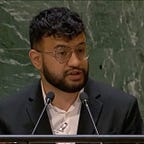What “Nuclear Justice” Means
While it is important that close diplomatic relations between the Marshall Islands and the United States be maintained, the Marshallese government must demand a new relationship based on trust, accountability, and transparency from the White House and Congress on behalf of its people.
The U.S. government has consistently minimized its responsibility in the nuclear testing legacy. During the testing period, the U.S. ignored formal pleas by Marshallese leaders to stop testing in the aftermath of the devastating Castle Bravo detonation in 1954. They minimized the extent of the damage while Atomic Energy Commission (later DOE) doctors conducted a secret study on severely exposed men, women, and children without their knowledge or consent. They attempted to normalize radiation exposure as naturally occurring, and thus absolving themselves of all responsibility for radiation exposure-caused, generational illnesses. In the Compact they limited recognition of nuclear-affected populations to the four atolls, when their own records identify many more atoll populations as nuclear exposed.
With the partial declassification of documents in the 1990s, RMI officials submitted a Changed Circumstances Petition based on US-produced documentary evidence that was in line with what Marshallese victims and survivors had been saying all along. But that petition was rejected.
Now, fearing growing Chinese influence in the region, U.S. officials are eager to lock down a deal with the RMI negotiating team, and an MOU has been signed.
Not so fast, please.
The status quo must change. The U.S. government must show transparency and take responsibility for its actions and inactions. It must declassify all documents pertaining to the testing, including removing all redactions. It must also allow an independent team of experts to assess the extent and actual costs of nuclear damages, including Runit Dome and its lagoon that contains, according to U.S. military personnel who served there, tons of nuclear waste.
It is important to note that full nuclear clean-up assessment costs have never been thoroughly conducted in the Marshall Islands. U.S. government officials claim that there have been too many assessments conducted in the past, then why is there no recent, thorough cost analysis? Even if cleanup is impossible, it is crucial that a team of independent experts assess the nuclear damage and determine the full cost of cleanup so the RMI negotiating team can come to the table with an accurate understanding of damages.
Though hard figures being tossed between negotiators are not formally shared with the public, we hear numbers of $3 billion to $15 billion. These figures are dwarfed by cleanup estimates for Fukushima, for example. The Japanese government has estimated that the cost of cleaning up Fukushima sits at $235 billion, which includes the cost of decontamination and victims’ compensation. Those clean-up costs could rise to $700 billion based on estimates from the Japan Center for Economic Research. A series of studies conducted by Columbia University K=1 found that some parts of the Marshall Islands are more radioactive than Fukushima. Furthermore, Hanford, one of the main sources of plutonium used to produce the 67 nuclear weapons, is estimated by the DOE to cost upwards of $640 billion to clean up.
R.M.I. government officials have said repeatedly they demand nuclear justice and will not sign any new agreement unless that goal is achieved. Yet, how can nuclear justice be attained if there is no accurate cost basis from which to start?
The Marshallese government must also demonstrate transparency and accountability and demand nuclear justice for ALL its people-those on the home islands and in diaspora. The Marshallese government has the right to insist upon third party assessments and to take that data to the negotiating table. If the Compact agreement must be delayed, then negotiate a short-term deal until accurate estimates can be made available.
The R.M.I. government must also recognize that the Compact negotiating team is not the only Marshallese voice. It should turn to its strength, its people, and utilize their voices and those of our allies in this process. Our national motto is Jepelpelin Ke Ejukaan — Through Joint Efforts. Nuclear justice can be achieved if all work together and demand fair treatment from the U.S. government.
Benetick Kabua Maddison
Executive Director, Marshallese Educational Initiative
Op-Ed published in the Marshall Islands Journal, May 26, 2023
